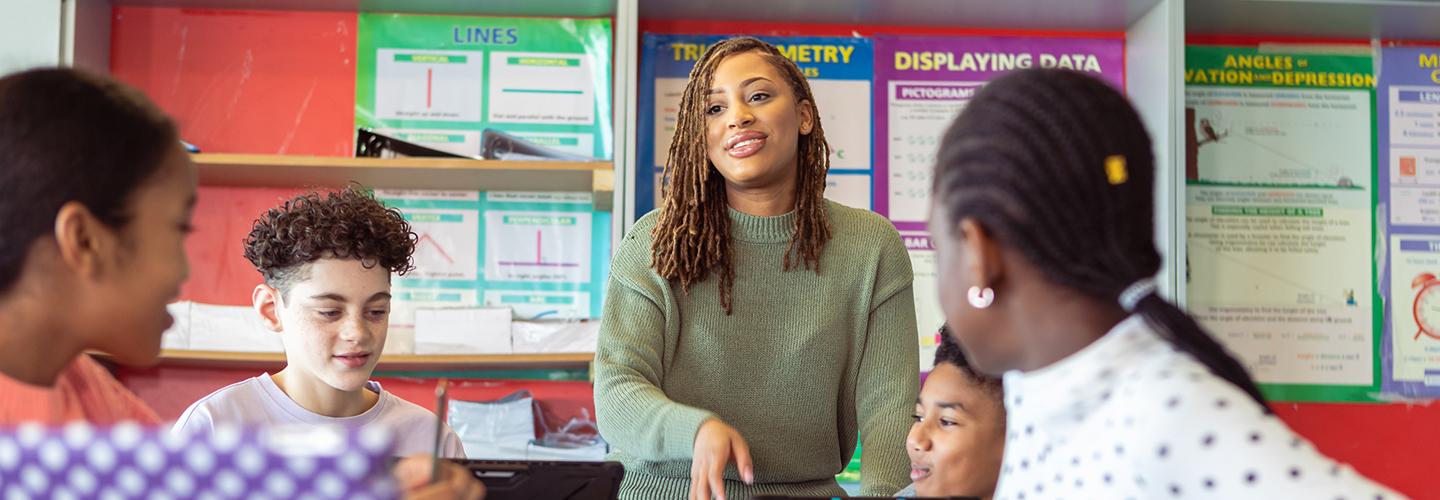
What Teachers Should Know About Supporting Black and Latino Students’ Math Engagement After the Pandemic
Author
The Adapted Measure of Math Engagement Research Group includes five students (Aubrey Caldwell, Antonio Chavira, Brianna Espy, Serrah Ssemukutu, and Diamond Tony-Uduhirinwa), five teachers (Nate Earley, Karina Mazurek, Kathleen Morgan, Karla Rokke, and Ashly Tritch), and five researchers (Marisa Crowder, Samantha E. Holquist, Diane (Ta-Yang) Hsieh, Claire Kelley, and Mark Vincent B. Yu). Alyssa Scott and Laney Taylor also extensively contributed to this work.
Disruptions in learning caused by the COVID-19 pandemic continue to exacerbate racial/ethnic achievement gaps in math, with declines in math scores more pronounced among Black and Latino students than among their White peers, according to the National Assessment of Educational Progress. Increasing evidence suggests that the enduring racial/ethnic disparities in math are closely linked to educational factors that undermine student engagement, but our new analysis suggests that teachers can play a role in supporting Black and Latino kids’ math engagement.
Although many school and district improvement efforts have strived to increase math engagement for over a decade, many students experience a significant decline in their math engagement during middle school, particularly Black and Latino students. Due to these shifts, it is critical that teachers understand math engagement from a lens that uplifts Black and Latino students’ cultural experiences and strengths.
In the first year of a three-year study, the Adapted Measure of Math Engagement (or AMME), the AMME Research Group collected and analyzed data from student self-report surveys, student focus groups, and teacher interviews. Based on these data, we identified four important takeaways for teachers to better support Black and Latino students’ engagement in math:
1Relationships with teachers and peers are the foundation for Black and Latino student engagement in math.
Research shows that positive relationships are essential to supporting students’ math engagement, and our findings align with this research. Black and Latino students and their math teachers identified student-teacher relationships and peer relationships as the most important factors that influenced their engagement in math. When Black and Latino students feel their math teachers care about them as a person, they are more likely to want to engage during class. Further, being able to work with peers—and choosing who they work with during work time—can also positively influence math engagement.
2Black and Latino students thrive when they have a web of relationships to support their math engagement.
Receiving support from a variety of people—including parents/guardians, caregivers, grandparents, siblings, cousins, and community members—is an asset for Black and Latino student math engagement. For example, parents encouraging their students to do well in math can be a motivating factor that supports math engagement. However, this relationship has historically been understudied. School-sponsored and cultural-specific student spaces, language supports, and cultural liaisons can all serve as resources that teachers can leverage to support Black and Latino math engagement. The next phase of our research will focus more specifically on these supports.
3Feeling competent in math is an essential component of Black and Latino students’ engagement in math.
It’s not surprising that when Black and Latino students understand math concepts, they describe feeling confident and happy, which in turn makes them even more engaged in math. In contrast, when they don’t understand math concepts, they feel frustrated and stressed, or that they are falling behind—all of which are barriers to engagement. Black and Latino students and their math teachers mentioned several factors that make it challenging to understand math, such as learning new concepts too quickly, stigma around making mistakes, and learning losses resulting from COVID-19.
4Black and Latino students feel motivated to do math when they have external expectations to do well in math and feel that math relates to their future.
Black and Latino students often find motivation to engage in math from external sources. Students shared that they felt motivated when their teachers, peers, and/or family members set high expectations for their math achievement. Further, students shared that they were motivated to do math when it clearly connected to their future goals—often created in partnership with teachers, peers, and/or family members.
For more details about these takeaways and actionable strategies to implement in classrooms, check out our new resources for teachers:
- Understanding Black and Latina/o Students’ Math Engagement – Sharing Year 1 Findings: A professional development slide deck to support teachers in interacting with and discussing our Year 1 findings.
- Adapted Measure of Math Engagement Professional Development Companion Piece: A companion guide with more information about strategies teachers can implement in their classrooms to support Black and Latina/o student engagement.
- Year 1 Survey Results: Data on how Black and Latina/o students responded to a survey about engagement in math.
This project is funded by the National Science Foundation, grant #2200437. Any opinions, findings, and conclusions or recommendations expressed in these materials are those of the author(s) and do not necessarily reflect the views of the National Science Foundation.
Suggested citation: Adapted Measure of Math Engagement Research Group. (2024). What teachers should know about supporting Black and Latino students’ math engagement after the pandemic. Child Trends. DOI: 10.56417/7674j6650g
© Copyright 2025 ChildTrendsPrivacy Statement
Newsletter SignupLinkedInYouTubeBlueskyInstagram